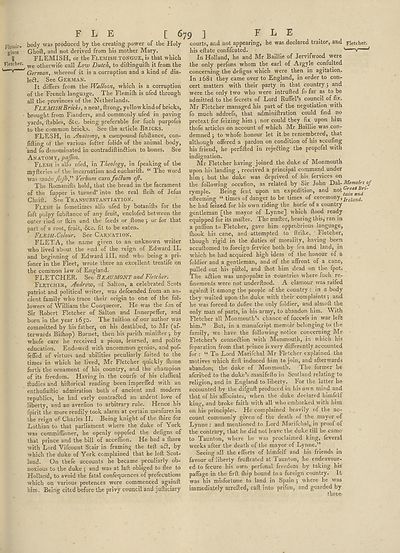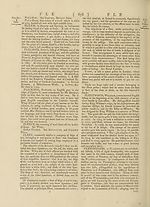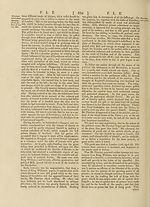Encyclopaedia Britannica, or, a Dictionary of arts, sciences, and miscellaneous literature : enlarged and improved. Illustrated with nearly six hundred engravings > Volume 8, ELE-FOR
(725) Page 679
Download files
Complete book:
Individual page:
Thumbnail gallery: Grid view | List view

F L E
Flemlr- body was produced by the creating power of the Holy
gians Ghoft, and not derived from his mother Mary.
& II FLEMISH, or the Flemish tongue, is that which
Fletcher. we 0t,herwife call Low Dutch, to diftinguidi it from the
L" ’ German, whereof it is a corruption and a kind of dia¬
led. See German.
It differs from the Walloon, which is a corruption
of the French language. The Flemilh is ufed through
all the provinces of the Netherlands.
Flemish Bricks, a neat, ftrong, yellow kind of bricks,
brought from Flanders, and commonly ufed in paving
yards, (tables, &c. being preferable for fuch purpofes
to the common bricks. See the article Bricks.
FLESH, in Anatomy, a compound fubltance, con¬
fiding of the various fofter folids of the animal body,
and fo denominated in contradiftin&ion to bones. See
Anatomy, paffim.
Flesh is alfo ufed, in Theology, in fpeaking of the
myfteries of the incarnation and eucharift. “ The word
was madefi-Jh” Verbum carofaElum ejl.
The Romanifts hold, that the bread in the facrament
of the fupper is turned* into the real flefh of Jefus
Chrift. See Transubstantiation.
Flesh is fometimes alfo ufed by botanifts for the
foft pulpy fubltance of any fruit, enclofed between the
outer rind or fkin and the feeds or (tone j or for that
part of a root, fruit, &o. fit to be eaten.
Flesh.Colour. See Carnation.
FLETA, the name given to an unknown writer
who lived about the end of the reign of Edward II.
and beginning of Edward III. and who being a pri-
foner in the Fleet, wrote there an excellent treatife on
the common law of England.
FLETCHER. See Beaumont and Fletcher.
Fletcher, Andrew, of Salton, a celebrated Scots
patriot and political writer, was defcended from an an¬
cient family who trace their origin to one of the fol¬
lowers of William the Conqueror. Fie was the fon of
Sir Robert Fletcher of Salton and Innerpeffer, and
born in the year 1650. The tuition of our author was
committed by his father, on his deathbed, to Mr (af¬
terwards Bilhop) Burnet, then his parilh minifter; by
whofe care he received a pious, learned, and polite
education. Endowed with uncommon genius, and pof-
feffed of virtues and abilities peculiarly fuited to the
times in which he lived, Mr Fletcher quickly (hone
forth the ornament of his country, and the champion
of its freedom. Having in the courfe of his claffical
Rudies and hiftorical reading been impreffed with an
enthufiaftic admiration both of ancient and modern
republics, he had early contrafted an ardent love of
liberty, and an averfion to arbitrary rule. Hence his
fpirit the more readily took alarm at certain meafuresin
the reign of Charles II. Being knight of the (hire for
Lothian to that parliament where the duke of York
was commiffioner, he openly oppofed the defigns of
that prince and the bill of acceffion. He had a fhare
with Lord Vifcount Stair in framing the tell aft, by
which the duke of York complained that he loft Scot¬
land. On thefe accounts he became peculiarly ob¬
noxious to the duke j and was at laft obliged to flee to
Holland, to avoid the fatal confequences of profecutions
which on various pretences were commenced againft
him. Being cited before the privy council and jufticiary
[ 679 1
F L E
courts, and not appearing, he was declared traitor, and Fletcher,
his eftate confifcated. '■ '“’’v 1 11
In Holland, he and Mr Baillie of Jervifwood were
the only perfons whom the earl of Argyle confulted
concerning the defigns which were then in agitation.
In 1681 they came over to England, in order to con¬
cert matters with their party in that country j and
were the only two who were intrufted fo far as to be
admitted to the fecrets of Lord Ruffel’s council of fix.
Mr Fletcher managed his part of the negotiation with
fo much addrefs, that adminiftration could find no
pretext for feizing him ; nor could they fix upon him
thofe articles on account of which Mr Baillie was con¬
demned } to whofe honour let it be remembered, that
although offered a pardon on condition of his accufing
his friend, he perfifted in rejefting the propofal wdth
indignation.
Mr Fletcher having joined the duke of Monmouth
upon his landing , received a principal command under
him ; but the duke was deprived of his fervices on
the following occafion, as related by Sir John Dal- Memoirs oj
rymple. Being fent upon an expedition, and not^Tfl*^*
efteeming “ times of danger to be times of ceremony>/rf/(jn</,
he had feized for his own riding the horfe of a country
gentleman [the mayor of Lynne] which flood ready
equipped for its mafter. The mailer, hearing this, ran in
a paflion to Fletcher, gave him opprobrious language,
fhook his cane, and attempted to ftrike. Fletcher,
though rigid in the duties of morality, having been
accuftomed to foreign fervice both by fea and land, in
which he had acquired high ideas of the honour of a
foldier and a gentleman, and of the affront of a cane,
pulled out his pillol, and {hot him dead on the fpot.
The a£lion was unpopular in countries where fuch re¬
finements were not underflood. A clamour was raifed
againft it among the people of the country : in a body
they waited upon the duke with their complaints; and
he w’as forced to defire the only foldier, and almofl the
only man of parts, in his army, to abandon him. With
Fletcher all Monmouth’s chance of fuccels in war left
him.” But, in a manufcript memoir belonging to the
family, we have the following notice concerning Mr
Fletcher’s connedlion with Monmouth, in which his
feparation from that prince is very differently accounted
for : “ To Lord Marifchal Mr Fletcher explained the
motives which firft induced him to join, and afterwards
abandon, the duke of Monmouth. The former he
afcribed to the duke’s manifefto in Scotland relating to
religion, and in England to liberty. For the latter he
accounted by the difguft produced in his own mind and
that of his affociates, when the duke declared himfelf
king, and broke faith with all who embarked with him
on his principles. He complained heavily of the ac¬
count commonly given of the death of the mayor of
Lynne : and mentioned to Lord Marifchal, in proof of
the contrary, that he did not leave the duke till he came
to Taunton, where he was proclaimed king, feveral
weeks after the death of the mayor of Lynne.”
Seeing all the efforts of himfelf and his friends in
favour of liberty fruflrated at Taunton, he endeavour¬
ed to fecure his own perfonal freedom by taking his
palfage in the firft {hip bound to a foreign country. It
was his misfortune to land in Spain j where he was
immediately arrefled, caft into prifon, and guarded by
three
Flemlr- body was produced by the creating power of the Holy
gians Ghoft, and not derived from his mother Mary.
& II FLEMISH, or the Flemish tongue, is that which
Fletcher. we 0t,herwife call Low Dutch, to diftinguidi it from the
L" ’ German, whereof it is a corruption and a kind of dia¬
led. See German.
It differs from the Walloon, which is a corruption
of the French language. The Flemilh is ufed through
all the provinces of the Netherlands.
Flemish Bricks, a neat, ftrong, yellow kind of bricks,
brought from Flanders, and commonly ufed in paving
yards, (tables, &c. being preferable for fuch purpofes
to the common bricks. See the article Bricks.
FLESH, in Anatomy, a compound fubltance, con¬
fiding of the various fofter folids of the animal body,
and fo denominated in contradiftin&ion to bones. See
Anatomy, paffim.
Flesh is alfo ufed, in Theology, in fpeaking of the
myfteries of the incarnation and eucharift. “ The word
was madefi-Jh” Verbum carofaElum ejl.
The Romanifts hold, that the bread in the facrament
of the fupper is turned* into the real flefh of Jefus
Chrift. See Transubstantiation.
Flesh is fometimes alfo ufed by botanifts for the
foft pulpy fubltance of any fruit, enclofed between the
outer rind or fkin and the feeds or (tone j or for that
part of a root, fruit, &o. fit to be eaten.
Flesh.Colour. See Carnation.
FLETA, the name given to an unknown writer
who lived about the end of the reign of Edward II.
and beginning of Edward III. and who being a pri-
foner in the Fleet, wrote there an excellent treatife on
the common law of England.
FLETCHER. See Beaumont and Fletcher.
Fletcher, Andrew, of Salton, a celebrated Scots
patriot and political writer, was defcended from an an¬
cient family who trace their origin to one of the fol¬
lowers of William the Conqueror. Fie was the fon of
Sir Robert Fletcher of Salton and Innerpeffer, and
born in the year 1650. The tuition of our author was
committed by his father, on his deathbed, to Mr (af¬
terwards Bilhop) Burnet, then his parilh minifter; by
whofe care he received a pious, learned, and polite
education. Endowed with uncommon genius, and pof-
feffed of virtues and abilities peculiarly fuited to the
times in which he lived, Mr Fletcher quickly (hone
forth the ornament of his country, and the champion
of its freedom. Having in the courfe of his claffical
Rudies and hiftorical reading been impreffed with an
enthufiaftic admiration both of ancient and modern
republics, he had early contrafted an ardent love of
liberty, and an averfion to arbitrary rule. Hence his
fpirit the more readily took alarm at certain meafuresin
the reign of Charles II. Being knight of the (hire for
Lothian to that parliament where the duke of York
was commiffioner, he openly oppofed the defigns of
that prince and the bill of acceffion. He had a fhare
with Lord Vifcount Stair in framing the tell aft, by
which the duke of York complained that he loft Scot¬
land. On thefe accounts he became peculiarly ob¬
noxious to the duke j and was at laft obliged to flee to
Holland, to avoid the fatal confequences of profecutions
which on various pretences were commenced againft
him. Being cited before the privy council and jufticiary
[ 679 1
F L E
courts, and not appearing, he was declared traitor, and Fletcher,
his eftate confifcated. '■ '“’’v 1 11
In Holland, he and Mr Baillie of Jervifwood were
the only perfons whom the earl of Argyle confulted
concerning the defigns which were then in agitation.
In 1681 they came over to England, in order to con¬
cert matters with their party in that country j and
were the only two who were intrufted fo far as to be
admitted to the fecrets of Lord Ruffel’s council of fix.
Mr Fletcher managed his part of the negotiation with
fo much addrefs, that adminiftration could find no
pretext for feizing him ; nor could they fix upon him
thofe articles on account of which Mr Baillie was con¬
demned } to whofe honour let it be remembered, that
although offered a pardon on condition of his accufing
his friend, he perfifted in rejefting the propofal wdth
indignation.
Mr Fletcher having joined the duke of Monmouth
upon his landing , received a principal command under
him ; but the duke was deprived of his fervices on
the following occafion, as related by Sir John Dal- Memoirs oj
rymple. Being fent upon an expedition, and not^Tfl*^*
efteeming “ times of danger to be times of ceremony>/rf/(jn</,
he had feized for his own riding the horfe of a country
gentleman [the mayor of Lynne] which flood ready
equipped for its mafter. The mailer, hearing this, ran in
a paflion to Fletcher, gave him opprobrious language,
fhook his cane, and attempted to ftrike. Fletcher,
though rigid in the duties of morality, having been
accuftomed to foreign fervice both by fea and land, in
which he had acquired high ideas of the honour of a
foldier and a gentleman, and of the affront of a cane,
pulled out his pillol, and {hot him dead on the fpot.
The a£lion was unpopular in countries where fuch re¬
finements were not underflood. A clamour was raifed
againft it among the people of the country : in a body
they waited upon the duke with their complaints; and
he w’as forced to defire the only foldier, and almofl the
only man of parts, in his army, to abandon him. With
Fletcher all Monmouth’s chance of fuccels in war left
him.” But, in a manufcript memoir belonging to the
family, we have the following notice concerning Mr
Fletcher’s connedlion with Monmouth, in which his
feparation from that prince is very differently accounted
for : “ To Lord Marifchal Mr Fletcher explained the
motives which firft induced him to join, and afterwards
abandon, the duke of Monmouth. The former he
afcribed to the duke’s manifefto in Scotland relating to
religion, and in England to liberty. For the latter he
accounted by the difguft produced in his own mind and
that of his affociates, when the duke declared himfelf
king, and broke faith with all who embarked with him
on his principles. He complained heavily of the ac¬
count commonly given of the death of the mayor of
Lynne : and mentioned to Lord Marifchal, in proof of
the contrary, that he did not leave the duke till he came
to Taunton, where he was proclaimed king, feveral
weeks after the death of the mayor of Lynne.”
Seeing all the efforts of himfelf and his friends in
favour of liberty fruflrated at Taunton, he endeavour¬
ed to fecure his own perfonal freedom by taking his
palfage in the firft {hip bound to a foreign country. It
was his misfortune to land in Spain j where he was
immediately arrefled, caft into prifon, and guarded by
three
Set display mode to:
![]() Universal Viewer |
Universal Viewer | ![]() Mirador |
Large image | Transcription
Mirador |
Large image | Transcription
Images and transcriptions on this page, including medium image downloads, may be used under the Creative Commons Attribution 4.0 International Licence unless otherwise stated. ![]()
| Permanent URL | https://digital.nls.uk/192272844 |
|---|
| Attribution and copyright: |
|
|---|
| Description | Ten editions of 'Encyclopaedia Britannica', issued from 1768-1903, in 231 volumes. Originally issued in 100 weekly parts (3 volumes) between 1768 and 1771 by publishers: Colin Macfarquhar and Andrew Bell (Edinburgh); editor: William Smellie: engraver: Andrew Bell. Expanded editions in the 19th century featured more volumes and contributions from leading experts in their fields. Managed and published in Edinburgh up to the 9th edition (25 volumes, from 1875-1889); the 10th edition (1902-1903) re-issued the 9th edition, with 11 supplementary volumes. |
|---|---|
| Additional NLS resources: |
|

